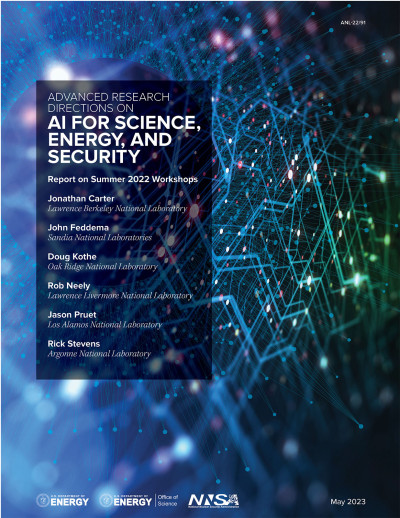Berkeley Lab Plays Major Role in Developing the DOE Vision for AI
New report details a comprehensive approach to using and expanding capabilities in AI
June 12, 2023
By Carol Pott
Contact: cscomms@lbl.gov
 Artificial intelligence (AI), machine learning, and deep learning have been enabling a wide breadth of U.S. Department of Energy (DOE) mission science for over a decade. AI, empowered by computation and unprecedented volumes of data, is improving scientific workflows, providing astonishing insights into scientific results, creating new classes of observations using computer vision, and accelerating scientific discovery in transformative ways.
Artificial intelligence (AI), machine learning, and deep learning have been enabling a wide breadth of U.S. Department of Energy (DOE) mission science for over a decade. AI, empowered by computation and unprecedented volumes of data, is improving scientific workflows, providing astonishing insights into scientific results, creating new classes of observations using computer vision, and accelerating scientific discovery in transformative ways.
With the power and breadth of AI as a tool rapidly accelerating, the national laboratories, under the guidance of DOE’s Office of Science (SC) and the National Nuclear Security Administration (NNSA), released a follow-up to the 2020 AI for Science report to address the dramatic changes in scale and scope that have occurred since that report was released and frame the foundational impact AI can have on a broad range of DOE missions, including science, energy, and national security. A team from Lawrence Berkeley National Laboratory (Berkeley Lab) played key roles in organizing the workshops and developing the new report, Advanced Research Directions on AI for Science, Energy, and Security.
The report synthesizes input from a series of workshops organized by the national laboratories that were designed to gather insight on “new and emerging opportunities and challenges of scientific AI.” Jonathan Carter, associate lab director in the Computing Sciences Area, served on the Program Committee. Berkeley Lab hosted the second of three workshops with Bert de Jong, senior scientist and head of the Computational Science Department, as co-chair. Deborah Agarwal, division director of Scientific Data; Stefan Wild, division director of Applied Mathematics and Computational Research; Damian Rouson, lead of the Computer Languages and Systems Software Group; Silvia Crivelli, staff scientist in the Applied Computing for Scientific Discovery Group; and de Jong were all key contributors to the report.
Detailing a comprehensive vision to leverage and expand new capabilities in AI to accelerate progress, the report also addresses “grand challenges” where AI plays a major role in making progress towards solutions, the crucial importance of “Responsible AI”, and the issues of bias, transparency and explainability, data security, validation, and accuracy. The report lays out six crucial foundational AI methodologies and explains their potential to transform DOE’s science, energy, and security mission areas, identifies crosscutting technology to enable those transformations, and assesses DOE’s workforce, computational capability, and data infrastructure to determine its ability to influence those advancements.
“From its experience managing large-scale projects encompassing multidisciplinary teams, to its powerful computational resources and data-rich user facilities, the DOE complex is uniquely positioned to develop and deploy AI techniques, algorithms, and frameworks to accelerate its mission,” said Carter. “This report represents a bold vision for the future role of AI in science developed in concert with colleagues across the national laboratories, academia, and industry.”
About Computing Sciences at Berkeley Lab
High performance computing plays a critical role in scientific discovery. Researchers increasingly rely on advances in computer science, mathematics, computational science, data science, and large-scale computing and networking to increase our understanding of ourselves, our planet, and our universe. Berkeley Lab’s Computing Sciences Area researches, develops, and deploys new foundations, tools, and technologies to meet these needs and to advance research across a broad range of scientific disciplines.







 Instagram
Instagram YouTube
YouTube